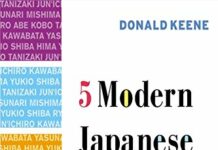
Ebook Info
- Published: 2005
- Number of pages: 928 pages
- Format: PDF
- File Size: 6.10 MB
- Authors: Donald Keene
Description
When Emperor Meiji began his rule, in 1867, Japan was a splintered empire, dominated by the shogun and the daimyos, who ruled over the country’s more than 250 decentralized domains and who were, in the main, cut off from the outside world, staunchly antiforeign, and committed to the traditions of the past. Before long, the shogun surrendered to the emperor, a new constitution was adopted, and Japan emerged as a modern, industrialized state. Despite the length of his reign, little has been written about the strangely obscured figure of Meiji himself, the first emperor ever to meet a European. Most historians discuss the period that takes his name while barely mentioning the man, assuming that he had no real involvement in affairs of state. Even Japanese who believe Meiji to have been their nation’s greatest ruler may have trouble recalling a single personal accomplishment that might account for such a glorious reputation. Renowned Japan scholar Donald Keene sifts the available evidence to present a rich portrait not only of Meiji but also of rapid and sometimes violent change during this pivotal period in Japan’s history. In this vivid and engrossing biography, we move with the emperor through his early, traditional education; join in the formal processions that acquainted the young emperor with his country and its people; observe his behavior in court, his marriage, and his relationships with various consorts; and follow his maturation into a “Confucian” sovereign dedicated to simplicity, frugality, and hard work. Later, during Japan’s wars with China and Russia, we witness Meiji’s struggle to reconcile his personal commitment to peace and his nation’s increasingly militarized experience of modernization. Emperor of Japan conveys in sparkling prose the complexity of the man and offers an unrivaled portrait of Japan in a period of unique interest.
User’s Reviews
Editorial Reviews: From The New Yorker When Emperor Meiji ascended the throne, in 1867, Japan was a feudal, pre-industrial dictatorship, administered by sword-wielding samurai and closed off to foreigners. By the end of his reign, in 1912, the country had become a cosmopolitan constitutional monarchy and a military superpower, defeating Russia and China. Keene gracefully marshals evidence to illuminate this astonishing transformation by focussing on the earnest, dutiful Emperor, whose Confucian conscience obliged him to wear a patched uniform and to live in comfortless and shabby rooms. Unflinchingly describing such episodes as the Port Arthur massacre, Keene also shows how Meiji’s exercises of martial strength did not preclude a sincere distaste for war. Copyright © 2005 The New Yorker Review Few scholars are as well qualified to undertake this tremendous project…. [Keene’s] special gifts are on display in Emperor of Japan… [which] brings us as close to the inner life of the Meiji emperor as we are ever likely to get. ― New York Times Book ReviewUtterly brilliant… the best history in English of the emergence of modern Japan. ― Los Angeles TimesKeene gracefully marshals evidence to illuminate [an] astonishing transformation. ― New YorkerKeene does a heroic job of painting a personal picture of the Meiji Empire, which is an impossible task. ― The New York Review of BooksDistinguished and massively authoritative… This book probably comes as close as we shall ever get to the man himself. ― Times Literary Supplement (London)Despite the book’s massive scale, Keene’s graceful writing holds the reader’s interest throughout…. This should become the Meiji biography against which all others are judged. ― BooklistA fresh and fascinating portrait. ― ChoiceThis is a monumental work, the result of years of painstaking research and meticulous scholarship, unlikely to be superseded by any book about the Emperor Meiji in this century and destined to be required reading for all foreign students of the Restoration and the growth of modern Japan. — Hugh Cortazzi ― The Japan SocietyThe first reliable and full biography of the Japanese monarch in any language…. Carefully crafted, judicious, balanced, authoritative, it is another remarkable gift from a distinguished American author. ― Washington PostOne comes away from Keene’s lively account with the feeling that one person made an extraordinary difference in Japan’s history. ― Foreign AffairsEminently readable… a staggering achievement. ― Seattle Times/Post IntelligencerThe most complete picture possible of a sovereign who remains as distant as a proper Confucian ruler should. ― Publishers WeeklyKeene… is a master narrator with an eye for fascinating details. ― Library JournalThis book is as close to being a definitive biography of the Emperor Meiji as we are likely to see in Western languages. It is an important contribution to our understanding of Japan’s modernizing experience. — W. Dean Kinzley ― The Historian About the Author Donald Keene is Shincho Professor of Japanese Literature and University Professor Emeritus at Columbia University. He is the author of more than thirty books, including the definitive multi-volume history of Japanese literature. He lives in Tokyo and New York City. Read more
Reviews from Amazon users which were colected at the time this book was published on the website:
⭐Meiji is a mysterious figure who greatly determined Japan’s role in the 20th century. His motives and principles remain enigmatic after reading this book, but that only reflects the truth of his life, which was closed and very private. This biography provides lots of interesting details of his life and the history of Japan in the late 1800s and early 20th century. I’m knocking off a star because much of the book reads like a mundane journal of Meiji’s activities from year to year, and it gets somewhat boring. But I feel I learned a lot about Japanese history during this time, and the book is well worth a read for those interested in the topic.
⭐Many details, very in-depth detail. Good reading.
⭐A dense and meticulous well written history of the period. I was in heaven reading this.
⭐Pretty specific read. It is quite long and very detailed about who was doing what as the power shifted in Japan.
⭐There is very little of his personal life available. The last chapter emphasizes this as well as commenting on his Confucian stoic approach to life.The body of the book covers the details of what is known of his life.I found interesting the difficulty of keeping capable officers in the government. He often refused to let them resign.
⭐A fascinating account of the life, times, and deeds of a transformational Japanese emperor. I was particularly pleased by several things:- The background given of the reign and character of his father, Emperor Komei, early in the book;- The inclusion of the backgrounds of his key advisors, which helped provide context to their advice and actions;- The interspersing of tanka poems and other short writings, both in the original Japanese (using romaji) and as English translations, written by Emperor Meiji at key points in his reign; and- The presentation of the material in the form of a scholarly narrative rather than as a dry chronicle of deeds and major event.That said, if I could, I would rate this 4.75 stars rather than 5 for two reasons. First, in describing the Russo-Japanese War, in chapter 54 the author states that “[t]he ensuing Japanese victories at sea and on land are too well known to be recounted in detail again here.” The book was published in 2002, 98 years after the outbreak of the war in 1904. While in the scholarly community the author’s statement is undoubtedly accurate, as a casual reader I only knew some basic facts about that war. In fairness, the author does discuss the key battles of the war, but I still felt like there should have been a bit more coverage given how accessible the book as a whole is to casual readers. The second reason is that in discussing Emperor Meiji’s death, excerpts of obituaries from around the world are provided and some of them are in French without any translation included. Having a rudimentary knowledge of that language I was able to understand the broad strokes of most of them, but I think English translations should have been provided.Regardless, the book is well-written and well worth reading for anyone interested in the history of modern Japan.
⭐Well written history of the Era. A must have book to complete a collection of Japanese history. 5 star book.
⭐The author has managed to bring the Meiji era to life with this very detailed look at both the Emperor Meiji and the time period. The book starts with his father, the Emperor Komei, with emphasis on the political situation between Imperial and Shogunal factions. The birth of his son (the future Meiji) in 1852 is welcomed as now there is an Imperial heir. The young prince’s education and general upbringing are detailed. At the age of fifteen he is thrust into the position of Emperor by the death of his father.The forced opening of Japan in 1854 quickly brought many changes to the nation as well as the Imperial Restoration in 1868. Meiji oversaw his country emerge from a feudal state into the modern world. Japan managed to leap a few hundred years in a fifty year period. Both china and Russia were defeated by the new Japan in military conflicts. Railways and telegraphs were used to unify the country and the people were introduced to new ideas.A hefty read at 725 pages but essential for the historian’s library.
⭐I am often puzzled why there are so few biographies (at least in English) or Eastern rulers. It is not because they are uninteresting, nor because source material is lacking. This is an excellent exception to this rule. It is not only a fascinating biography of the Meiji Emperor, but it also throws substantial light on his predecessor (the Komei Emperor) and on a period in Japan’s history that is frequently just raced through (they were isolated;, they opened up; they became a great power).
⭐Excellent work, we get the feeling we are very close to Meiji at times, we accompany him on his travels throughout Japan, sit in on some crucial cabinet discussions and see up close, how Japan developed from Restoration to World Power. Started to read this one after watching the Japanese NHK Drama series ATSUHIME, which gives you a good look into the 1853-1868 world Meiji was born into. That is btw where the book starts and lay persons might find the many names and places confusing. Short, 10-12page-chapters. Some things could have been dealt with shorter, so the book would be trimmed from 700+pages to 500+ pages, but that is about the only negative. Ein Muss für Studierende und Japanologen.
⭐Excellent biography of this important figure in Japanese modern history and the turbulent times he lived in!
⭐Terrific study of Meiji Japan
⭐Se você gosta da história e da cultura do Japão, essa é uma leitura obrigatória. O livro conta em detalhes os eventos ocorridos durante o período do imperador Komei, mencionando até mesmo alguns eventos anteriores a este reinado e até chegar ao imperador Meiji. Donald Keene fez um ótimo trabalho em pesquisar todos os eventos ocorridos no Japão durante este período, principalmente a respeito das rebeliões e do Xogunato, mas também esclarece como era a vida cotidiana no Japão e o que mudou no país com a Restauração Meiji.
⭐
Keywords
Free Download Emperor of Japan: Meiji and His World, 1852-1912 in PDF format
Emperor of Japan: Meiji and His World, 1852-1912 PDF Free Download
Download Emperor of Japan: Meiji and His World, 1852-1912 2005 PDF Free
Emperor of Japan: Meiji and His World, 1852-1912 2005 PDF Free Download
Download Emperor of Japan: Meiji and His World, 1852-1912 PDF
Free Download Ebook Emperor of Japan: Meiji and His World, 1852-1912




